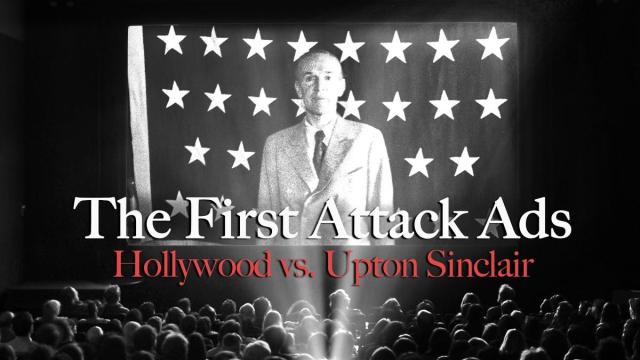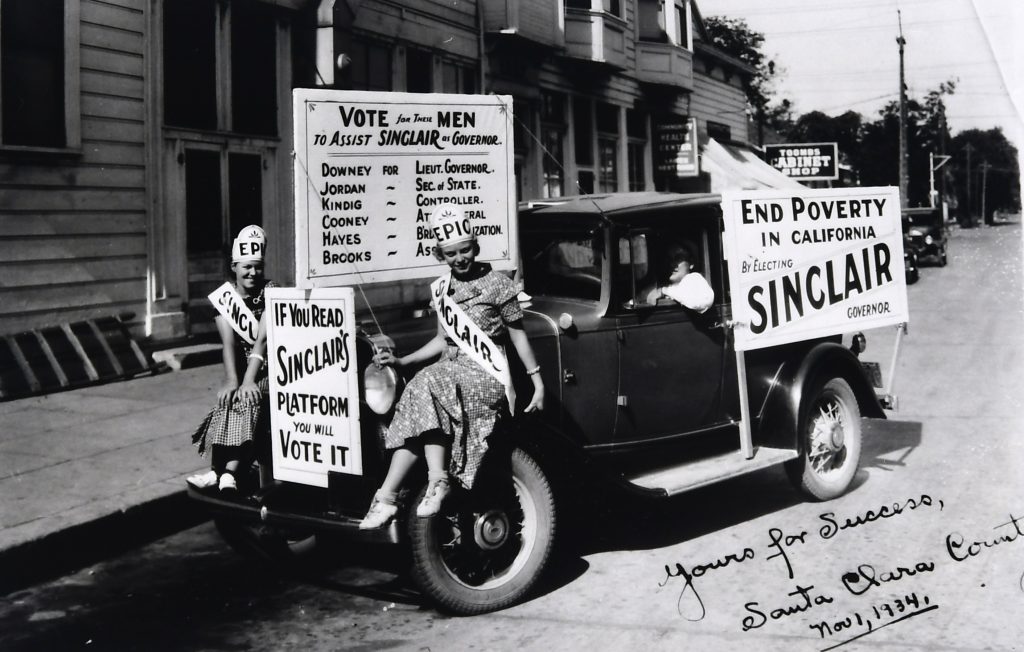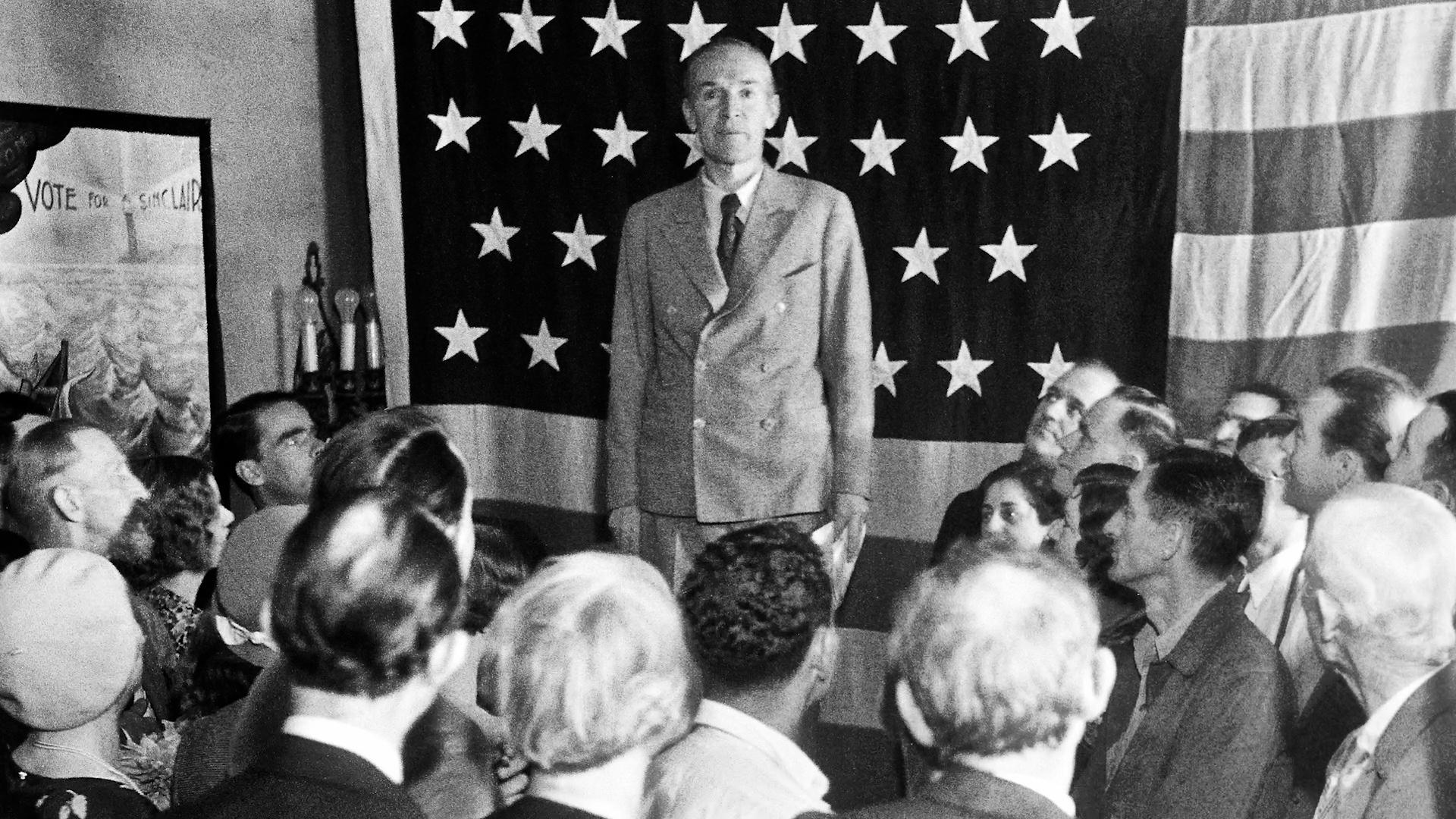
The stereotype of liberal Hollywood has, for many years, been a source of comedy for me. Wealthy stars and producers, making base gestures to their fans and feigning interest and support for moderately progressive policies and politicians, merely grandstand off the backs of activists and advocates. If they can draw some attention to a cause, that’s fine. But don’t for one moment believe that the majority of studios and celebrities want their taxes raised or their actions held to accountability.
Progressivism and socialism are “dangerous” words and labels in America, and have been since at least the early 20th century. With cinema growing from a mere novelty attraction into a full-fledged industry, it was only a matter of time before cinema as an art form would be used in the service of propaganda for the wealthy and powerful.
We see this process happening up-close in veteran journalist Greg Mitchell’s short documentary The First Attack Ads: Hollywood vs. Upton Sinclair, now streaming on PBS. In the film, which addresses the California campaign for Governor in 1934, the boundaries between politics and media become blurred. More than a race for the state’s highest office, the historic campaign upped the ante for spin doctors and advertisers.
Mitchell’s film tells the story of the desperately anti-socialist Democrat and Republican men of business and leadership who, seeing the famous writer Sinclair’s popularity build in California, feared a larger wave of action. In response, figures in Hollywood developed short segments of unattributed “news” that was shown before feature films at theaters, where they made their case against progress through tricks old and new.
The documentary runs at a fast pace, only catching its breath during the use of archival audio and footage, as voice-over narration and a barrage of historical photographs constitute the bulk of the movie. The First Attack Ads often feels stretched thin, rarely going deeper than a lecture taken out of a college film course. Sinclair’s fight, and the way Hollywood banded against him, could have been presented with more imagination so that it felt less bare bones.
When Netflix produced Mank in 2020, about the screenwriter behind Citizen Kane, hawk-eyed viewers noticed the familiar visage of one Bill Nye (the science guy) as a soap-box-standing, speech-giving Upton Sinclair. A portion of Mank takes place during the 1934 race and deals in part with the making and release of these attack ads in theaters across California.
But while that movie took liberties with its lead character’s politics, The First Attack Ads pulls no punches. Here, it’s clear who is on the wrong side of history and how their methods led to greater madness in the years that followed.
The film is at its best when showing and analyzing the pre-show reels—the attack ads—that ultimately cost Sinclair the election. Mitchell observes and articulates the dirtiness of the footage being played. These ads, presented without credit at the time, showed “average” California residents giving their opinions on the governor’s race and their ideas about the candidates. People choosing Sinclair were dressed and carried themselves poorly, their responses carefully cherry-picked and juxtaposed against other, more acceptable-looking commentators.
In one ad, an invasion of hordes of unemployed people coming by train into the state suggests, in not so subtle tones, the fear and anxiety of a population already in the midst of the Great Depression. The people’s slim slice of the economic pie is used like a dangling carrot in these ads, in ways that would prove effective. The message was clear: Be happy for what you have.
Sinclair wouldn’t win.
“If you’re gonna run for office, don’t write a novel,” the political scientist Dean McHenry says at one point in the film, referring to Sinclair’s effort writing a book that lays out his agenda. No, not exactly like Huey Long’s books, but maybe a cavalier move all the same. The silver lining to this rollback of potential state reform were the victories of local and regional Democrats down the line, and the labor unions and guilds formed for actors and other members of the film industry.
The First Attack Ads, despite being a somewhat mild and meek production, manages to put some bigger films about the era to shame through its collage of facts and the precise information it presents. On one hand, we learn how film innovation led to the evolution of political mud-slinging. On the other, speaking truth to power inspired future candidates to run and win.
Musician Woody Guthrie said, “Any tool is a weapon if you hold it right.” This can be applied to both sides of the filmmaking coin, past and present. And if grandstanding helps at all, let those with so much do so little.
RATING: 3/5
Bill Arceneaux is an independent film critic from New Orleans, LA. Follow him on Twitter at @billreviews and subscribe to his newsletter at moviegoing.rocks.
















